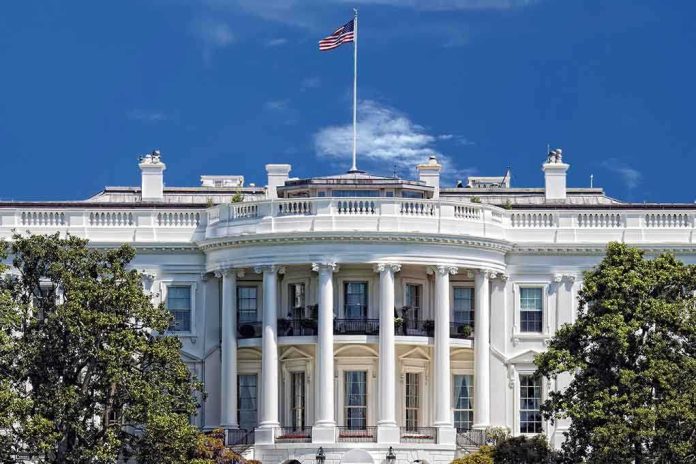
A White House official’s provocative claim against Adam Kinzinger raises questions about political ethics and personal privacy.
Story Snapshot
- White House Communications Director Steven Cheung posts alleged photos of Adam Kinzinger on Grindr.
- The photos’ authenticity and subject remain unverified and controversial.
- This incident highlights the escalation of personal attacks in political discourse.
- Implications for privacy, reputation, and political engagement are significant.
The Controversial Claim
Steven Cheung, White House Communications Director, posted a collage of half-naked photos on X, claiming they depicted former Congressman Adam Kinzinger. The images allegedly appeared on Grindr, a dating app, but neither the photos’ authenticity nor the identity of the person in them has been confirmed. This claim follows heated exchanges between Cheung and Kinzinger, escalating from policy disagreements to personal attacks.
White House official suggests married ex-GOP Rep. Adam Kinzinger posted half-naked photos on Grindr https://t.co/xZ3QFDzUN0 pic.twitter.com/Wf4g75wvpc
— New York Post (@nypost) October 24, 2025
The images show a tattoo similar to one Kinzinger has, but the face is not visible, leaving room for doubt. The lack of independent verification raises questions about the ethical boundaries of political attacks. Cheung’s move reflects a growing trend of using personal allegations to discredit opponents, a tactic that has become more prevalent in today’s polarized political climate.
Background and Context
Adam Kinzinger, known for his vocal criticism of Donald Trump, served on the January 6 committee and has been a prominent Republican voice against Trump. His marriage to Sofia Boza-Holman in 2020 and his advocacy for traditional values add layers to the controversy. Steven Cheung, a staunch defender of Trump policies, frequently engages in online confrontations.
The incident is not isolated but part of a pattern of escalating online confrontations between Cheung and Kinzinger. Previous exchanges often included barbs over policy decisions and personal appearances, setting the stage for this latest controversy. The U.S. political environment remains deeply divided, with personal attacks and “cancel culture” tactics increasingly common.
Implications for Political Discourse
This incident underscores the potential erosion of public trust in political discourse. By leveraging unverified personal allegations, political figures risk normalizing such tactics, which could deter individuals from entering public service due to privacy concerns. The immediate damage to Kinzinger’s reputation, especially among conservative audiences, is apparent, but the broader implications could be more damaging.
In the long term, this could further erode public trust in political discourse, normalize personal attacks as a strategy, and deepen partisan divides. The potential backlash against Cheung for engaging in unsubstantiated personal attacks may also affect his professional credibility, especially if the allegations prove false or unethical.
Current Developments and Reactions
As of October 24, 2025, the story has gained media traction, with outlets like the New York Post and Twitchy reporting on the allegations. However, they note the lack of corroboration, and Kinzinger has not publicly addressed the specific claims. The story remains unresolved, with no formal investigations or legal actions reported.
Public discourse is polarized, with reactions ranging from support to condemnation. Cheung continues to defend his posts, framing the exchange as a response to Kinzinger’s provocations. Meanwhile, media coverage emphasizes the lack of verification and the potential reputational risks for both parties involved.

